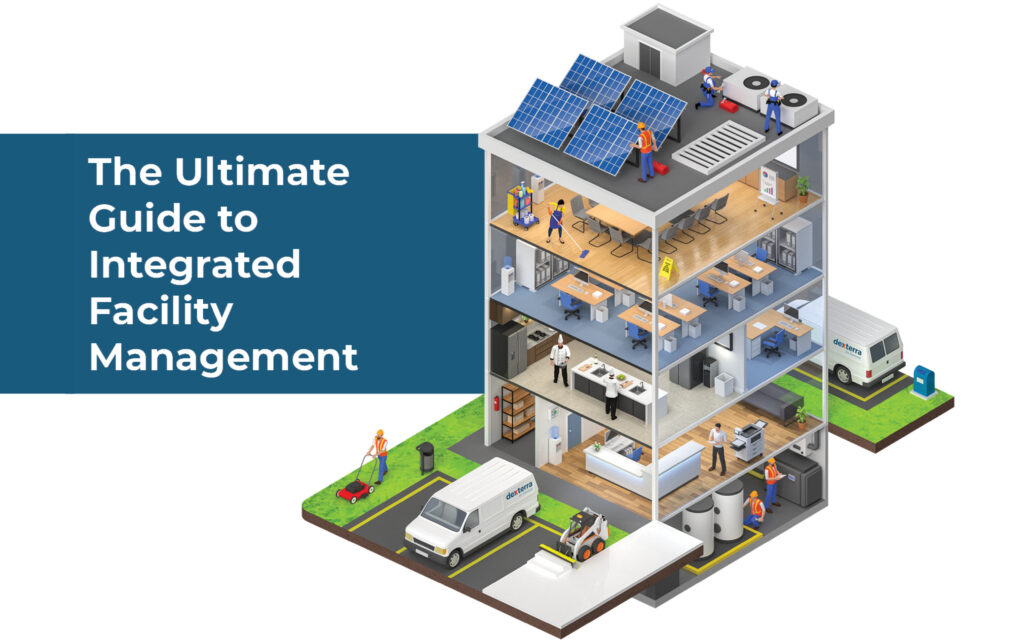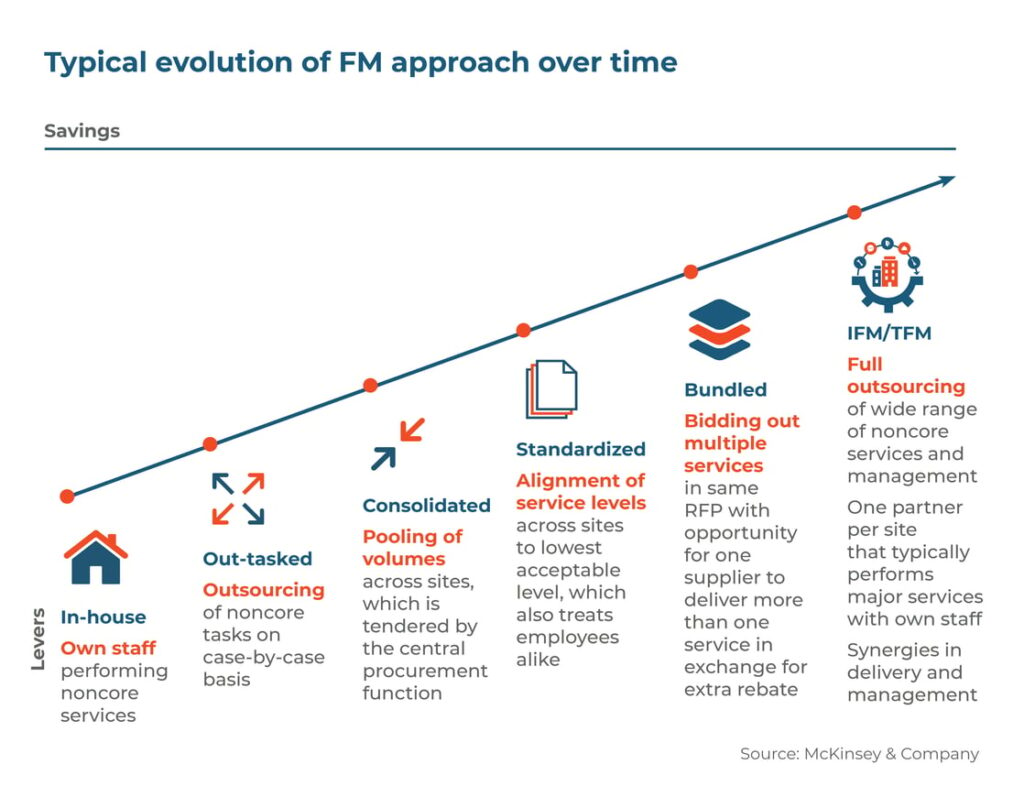Why Total Facility Management Is Essential for Company Success
Total Facility Management (TFM) works as a foundation for company success by integrating varied operational facets such as upkeep, space application, and precaution. This assimilation not only boosts efficiency yet likewise straightens facility management with overarching organizational purposes. As companies browse a competitive landscape, recognizing the complex benefits of TFM can be crucial in driving expense performance and improving worker productivity. The implications of embracing TFM expand much beyond instant functional gains, elevating crucial concerns concerning its long-term impact on organizational durability and competition. What exists below this necessary structure?
Comprehending Total Facility Management
Total Facility Management (TFM) incorporates a thorough approach to managing an organization's buildings and associated services to ensure optimum capability, safety and security, and performance. TFM incorporates numerous self-controls, consisting of maintenance, operations, space management, and safety and security methods, to produce a cohesive framework that supports a company's core goals.
At its core, TFM aims to improve the processes involved in facility management, decreasing redundancies and enhancing solution delivery. This method involves the control of activities related to building management, such as repair work, cleansing, and power management, to cultivate an effective setting for workers and stakeholders alike. TFM additionally highlights the importance of applying finest practices and cutting-edge innovations to improve solution high quality and reduce functional costs.
By straightening facility management tasks with organizational objectives, TFM boosts overall performance while making certain compliance with health and wellness, safety and security, and ecological policies. Therefore, TFM offers not just as a logistical function however additionally as a strategic asset, contributing to a company's lasting sustainability and development.
Secret Advantages of TFM
Leveraging a comprehensive method, organizations that apply Total Facility Management (TFM) unlock a myriad of benefits that add to overall service success. Among the key benefits of TFM is the improvement of operational efficiency. By consolidating facility services under a unified management structure, organizations can improve processes, minimize redundancies, and boost interaction throughout divisions.
In addition, TFM advertises an aggressive upkeep approach, which decreases downtime and expands the life-span of facilitiess and tools (Total Facility Management). This aggressive strategy not just improves efficiency however likewise promotes a safer working environment, ultimately resulting in higher employee complete satisfaction and retention rates
Additionally, TFM helps with better source appropriation by giving understandings into facility efficiency metrics. Organizations can recognize areas for improvement, allowing them to make enlightened choices that line up with their tactical objectives.
TFM and Price Effectiveness
Achieving cost performance is an essential goal for companies, and Total Facility Management (TFM) plays a pivotal duty in this venture - Total Facility Management. By integrating numerous facility services under a solitary management framework, TFM allows organizations to enhance operations and lower redundancies. This alternative approach brings about substantial expense financial savings, as it removes the demand for several suppliers and simplifies purchase processes
Moreover, TFM fosters aggressive maintenance approaches, which reduce the threat of expensive fixings and downtime. By prioritizing preventive procedures, companies can prolong the life-span of their possessions and lower unexpected expenses. Additionally, TFM integrates power management methods, which can dramatically reduce energy prices with reliable source usage.
The centralization of information and analytics Resources within TFM allows organizations to make educated economic decisions. By determining fads and areas for enhancement, TFM makes it possible for tailored strategies that even more improve price management. Additionally, the scalability of TFM options makes certain that as organizations expand, their facility management techniques continue to be efficient and aligned with financial goals.
Enhancing Worker Efficiency
A well-managed facility can substantially enhance staff member productivity by creating a conducive workplace. Effective Total Facility Management (TFM) ensures that all aspects of the workplace-- from lighting and temperature level to cleanliness and safety-- are optimized. When employees run in a room that is properly maintained and comfy, they are more probable to concentrate on their tasks, leading to greater result and job best site fulfillment.
Additionally, TFM can improve cooperation with the strategic design of communal locations, urging team effort and advancement. By buying the ideal sources and technology, companies can facilitate smooth interaction and enhance operations, even more boosting efficiency. Routine upkeep and punctual feedbacks to facility problems prevent disturbances that might or else impede performance.
Additionally, a risk-free and healthy job environment, sustained by TFM methods, lowers absence and advertises wellness, straight correlating with raised efficiency degrees. Inevitably, focusing on facility management is an investment not only in physical assets however additionally in the labor force itself. By cultivating an atmosphere that sustains worker needs and choices, organizations can cultivate an extra engaged and reliable workforce, driving general success and competitive advantage.

Future Trends in TFM
Welcoming technical advancements is set to reshape the landscape of Total Facility Management (TFM) in the coming years. As the need for performance and sustainability boosts, TFM will progressively adopt smart structure innovations, integrating Internet of Things (IoT) gadgets to handle and keep an eye on facility operations in real-time. This change will make it possible for positive upkeep, substantially boosting and lowering operational costs solution shipment.

Sustainability remains a check critical focus, with TFM experts anticipated to focus on environmentally friendly methods. This consists of making use of renewable resource resources and maximizing waste management systems to decrease the carbon footprint of facilitiess.
Remote management abilities will also be broadened, enabling facility managers to manage procedures from virtually anywhere. This versatility will certainly come to be crucial as companies adjust to crossbreed job versions. In recap, the future of TFM is positioned for transformation via modern technology, sustainability, and enhanced functional techniques, making certain businesses stay affordable in an evolving landscape.
Conclusion
By integrating various functional features, TFM enhances efficiency and lines up facility management with organizational objectives. As businesses progressively adopt cutting-edge innovations and sustainable methods, the importance of TFM will certainly proceed to grow, ensuring lasting functional efficiency and competitiveness in an evolving marketplace.
